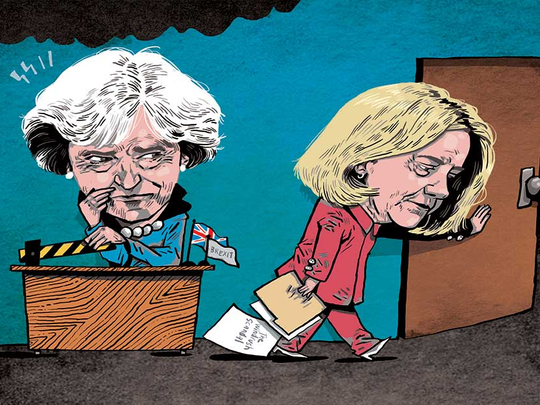
Amber Rudd’s resignation may have been inevitable from the day the Windrush row broke in Britain, but it was still a shock to everyone in the Conservative party, including the home secretary’s allies and Downing Street. Most Tories were settling down for a quiet night when the news broke late on Sunday. I had spent the day speaking to No 10 figures and Rudd’s friends and all had been confident that she would stay in the job.
On their weekly ring-around of MPs, the Conservative whips ask their charges about various big political issues that might cause trouble in the days ahead. You might expect, given the way it has dominated the front pages for two weeks now, that Windrush might get a mention in the round of calls. It didn’t. No one was planning for this resignation. Colleagues spoke warmly of Rudd. They felt there were plenty of extenuating circumstances for the home secretary ending up in a crisis where she appeared not to know what was going on in her own department. [The scandal erupted after Rudd insisted that she knew nothing of Home Office targets for immigration removals following the leak of a secret internal document prepared for her and other senior ministers. The six-page memo, passed to the Guardian, says the department has set “a target of achieving 12,800 enforced returns in 2017-18” and boasts that “we have exceeded our target of assisted returns”.]
One close ally of the prime minister did perhaps hint at strains between Theresa May and her minister when he described their relationship as “not so much warm, more sort of correct: Theresa gets on with Amber but then we are coming from a pretty low base given she’s also got Hammond and Boris as colleagues”.
That Rudd has gone might allow May to draw a line under the issue. Or, it might move the focus back from the competence of the minister charged with implementing the policy and onto the prime minister who designed it. It will also highlight once again quite how weak this government is. It’s not just that Rudd’s departure is the fourth cabinet resignation in six months, but also that there are other senior ministers who May would much rather see the back of who won’t go. That Philip Hammond and Boris Johnson are impossible to move has been a well-known Westminster fact. Both would work to destabilise May. Hammond is enjoying a reasonably stable time as chancellor, but Foreign Secretary Johnson has had a much rougher ride, regularly slipping up on sensitive matters – from the imprisonment of Nazanin Zaghari-Ratcliffe in Iran, to the details of the investigation into the Salisbury attack.
“Boris could have seized the job and proved to people that he is a very substantial politician. Instead he has not made his mark, save occasional gaffes,” claimed one May ally, who adds, pointing to Britain’s upcoming EU negotiations: “She can’t move him, but I think deep down he knows that the past two years have not been good for him, and that a Cabinet row on the customs union could give him the ideal opportunity to resign with his head held high.”
Leader’s weakness
Johnson’s allies say he is “despondent” at the way the Brexit talks are progressing, and that his resignation remains a real possibility. But his departure is in his own gift, not the prime minister’s, which is an extraordinary sign of weakness for a leader.
Similarly, Gavin Williamson is trying with little subtlety or grace to build up a power base in the Ministry of Defence, which makes him tricky to move anywhere save upwards, regardless of how effective he turns out to be. Rudd wasn’t an operator like her three male colleagues – when I asked her junior minister, Ben Wallace, what it was like to work with her, he said: “She’s genuinely one of the best bosses I’ve ever had.”
“She isn’t insecure, she does not transmit her ambitions into her department and make it all about her, and she likes team work” — and her desire to follow her boss’s lead rather than develop a threatening power base was what did it for her.
Her resignation will delight Brexiteers who had been very outspoken on Windrush, but it will make precious little difference to the cabinet dynamics as those close to May are adamant that the remain-leave balance of the cabinet must be maintained and that the next home secretary would have to be a like-for-like replacement for Rudd.
What a desperate position for a prime minister to be in: unable to move the operators, and afraid of being exposed by a row in her own former department. It translates into policy too: Tory MPs frequently complain to me that they are bored and barely required to vote on anything these days. “It’s like the last days of the coalition,” said one. “We now joke that we’re back to being able to say ‘goodbye and have a nice weekend’ straight after prime minister’s questions on a Wednesday, because there’s just nothing going on. We can go back to our constituencies early: but we are members of parliament, not members of a constituency.”
The old worries about a lack of a domestic agenda are resurfacing, with MPs now fretting about the government’s lack of vision for Britain aside from Brexit. This is an even worse sign than having the great offices of state filled with people who can’t be moved: when Tory MPs are bored, they start making trouble. If May can’t change her top team, she needs to consider making them do something that keeps her party busy – and that shows there’s still a point to the Tories being in government rather than just surviving crises.
— Guardian News & Media Ltd
Isabel Hardman is a political journalist and assistant editor of the Spectator.










